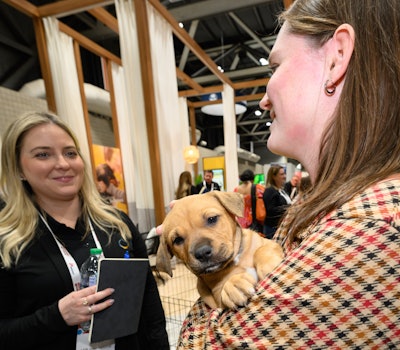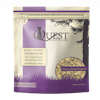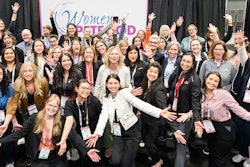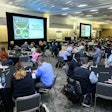
The path to leadership in the pet food industry isn't always straightforward, but for many successful women executives, mentorship has served as a crucial compass. During a recent Ask the Pet Food Pro panel discussion hosted by Petfood Industry and moderated by Lindsay Beaton, two distinguished leaders shared candid insights about how mentorship relationships have shaped their careers and transformed their approach to leadership.
Leah Lambrakis, vice president of research & development for Nutrition and Scientific Affairs at Simmons Pet Food and Simmons Animal Nutrition, and Leigh Ann Sayen, CEO of The Peterson Company, participated in the panel as part of a special two-part series on mentorship brought to you by Women in Pet Food Leadership.
Finding your voice through strategic guidance
For Lambrakis, mentorship played a pivotal role in helping her discover the difference between speaking up and speaking with purpose. "Early on, I used to think I needed to always speak up and have the answer, but I've learned that it's really about knowing your value, and communicating your value to the conversation with intention and clarity," she explained.
One of her most influential mentors taught her a transformative lesson about preparation and purposeful communication. "One mentor really showed me how to prepare, how to organize my thoughts, so I could really speak with purpose and not just be reactive or jumping in trying to be part of the conversation," Lambrakis said. This guidance helped her learn to "claim my seat at the table" intellectually, not just physically.
Lambrakis also shared a powerful framework she learned from a professional coach: the three C's -- clear, concise and compelling. "Start with the punchline," she advised. "Sometimes we get into a lot of the details and we'll lose the audience."
Navigating career transitions
Sayen's mentorship story centers around one of the most significant decisions of her career: purchasing The Peterson Company where she had been an employee. "I needed to lean into several mentors to help me to propel that decision," she recalled, noting that her mentors provided both financial guidance and confidence building.
What made these mentorship relationships particularly effective was their focus on clarity and alignment with her values. "They were the catalyst for my confidence to do it," Sayen said. "I knew I wanted to do it, but I wondered, do I have all the right things buttoned up? What they helped me with is having the confidence. It's going to be scary, no matter if you answer every question that comes into your mind. Lean into the fear."
Qualities that make mentorship work
Both women emphasized that successful mentorship relationships require intentionality and mutual benefit. Sayen highlighted the importance of reciprocity, noting that effective mentorship should be "propelling both the mentor and the mentee to different lines of thinking, different questions."
Lambrakis stressed the need for accountability and purposeful conversation. Her first mentor established clear expectations. "Come to the table with an intentional conversation," she advised. "It holds us accountable and shifts it from a casual conversation to a professional conversation."
The leaders also agreed that mentors don't necessarily need to be in the same field. Lambrakis shared an example of seeking guidance from a bank executive because she admired his leadership style and ability to drive results, despite his lack of pet food industry experience.
Overcoming imposter syndrome
Both executives candidly discussed their experiences with self-doubt and how mentors helped them reframe these challenges. Sayen, who joined her family business in 1999, initially struggled with questions about whether people viewed her as receiving preferential treatment.
Her mentors encouraged her to share success stories and view failures as growth opportunities. "It's important to have a space to tell your story and be able to say where your self-doubt rests -- know that we've all been there at various stages of self-doubt and imposter syndrome," Sayen explained.
Lambrakis approaches mentoring others through imposter syndrome by first listening and sharing her own experiences. "The first step is listening and sharing my own experiences, because I went through a lot of what Leanne just described very early in my career," she said. "I focus on grounding them in truth and their skills. I focus on what they've accomplished: the why, the wins, the impact that they bring to the business."
Practical advice for building networks
When it comes to growing professional networks, Lambrakis emphasized the importance of intentionality. "Growing your network as part of your career growth is so important," she said. "Regardless if you're in a transition or not, be sure to network across all levels, not just networking up but also connecting with suppliers, manufacturers, consultants and customers."
Her approach includes personal touches that leave lasting impressions. "I'm still the old school nerd that writes handwritten notes even in this very virtual, remote world," she said. "But I think even that little personalization leaves an impression on people."
Both women stressed the importance of thinking strategically beyond day-to-day tasks. Lambrakis encourages her team to "think beyond what they're doing and ask if what they're doing solves a bigger problem for the business."
She also emphasized the value of being present and listening in cross-functional meetings, noting that putting away devices and truly absorbing conversations helps connect dots and develop strategic thinking.
When it comes to the lifecycle of mentorship relationships, Lambrakis believes a mentorship relationship can have a natural season, and that it's important to regularly assess whether the relationship is still serving both parties.
"Are we still learning? Are we still growing? Are we still challenging each other in the right ways?" she asked. "If the answer is no, then maybe it's time to shift and step away." She noted it's important to continue expressing gratitude and maintaining connections even as formal mentorship relationship evolves.
Reflections and future guidance
Looking back on their careers, both women offered insights about what they wish they had learned earlier. Lambrakis wished someone had taught her about setting boundaries and the importance of knowing when to say "no."
"My inability to say 'no' early in my career was a hard lesson for me later on," she reflected.
Sayen emphasized the importance of understanding blind spots and asking mentors about experiences that might be relevant to future challenges. "What don't I know?" she said. "Whether it's professional, personal, or a combination, this is a valuable question to pose to mentors."
Women in Petfood Leadership (WIPL) will host its Mentor Mingle networking and mentoring event on August 14, 2025, from 2-4 p.m. during SuperZoo in Las Vegas. The innovative event, designed to accelerate professional development and build meaningful connections, will take place in the DJ Lounge adjacent to the Natural and Health section of the SuperZoo trade show floor.
About Women in Pet Food Leadership
Women in Pet Food Leadership (WIPL) brings together like-minded professional women in pet food to build a community and interact by offering opportunities for networking, career planning, leadership development and professional support. The organization continues to champion women's advancement in the pet food industry through innovative programming and meaningful connections. To become part of WIPL, join our LinkedIn group.



















